What starts off as an obvious sci-fi 16-bit 2D action RPG quickly turns into a JRPG inspired pseudo-MMO open-world puzzle platformer. Though at first glance this sounds like a jumbled mess, CrossCode manages to bundle all of its influences into a seamless gaming experience that feels nothing shy of excellent.
Note: CrossCode is not open source software. We have covered it because it is Linux specific.
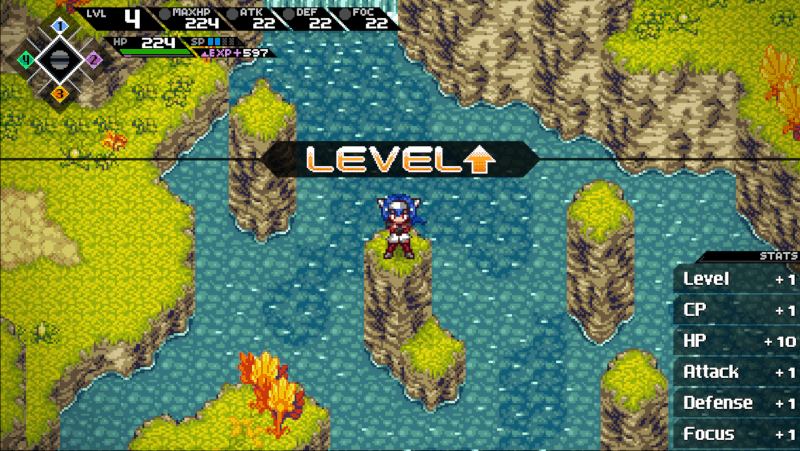
Story
You play as Lea, a girl who has forgotten her identity, where she comes from, and how to speak. As you walk through the early parts of the story, you come to find that you are a character in a digital world — a video game. But not just any video game — an MMO. And you, Lea, must venture into the digital world known as CrossWorlds in order to unravel the secrets of your past.
As you progress through the game, you unveil more and more about yourself, learning how you got to this point in the first place. This doesn’t sound too crazy of a story, but the gameplay implementation and appropriately paced storyline make for quite a captivating experience.
The story unfolds at a satisfying speed and the character’s development is genuinely gratifying — both fictionally and mechanically. The only critique I had was that it felt like the introductory segment took a little too long — dragging the tutorial into the gameplay for quite some time, and keeping the player from getting into the real meat of the game.
All-in-all, CrossCode’s story did not leave me wanting, not even in the slightest. It’s deep, fun, heartwarming, intelligent, and all while never sacrificing great character development. Without spoiling anything, I will say that if you are someone that enjoys a good story, you will need to give CrossCode a look.
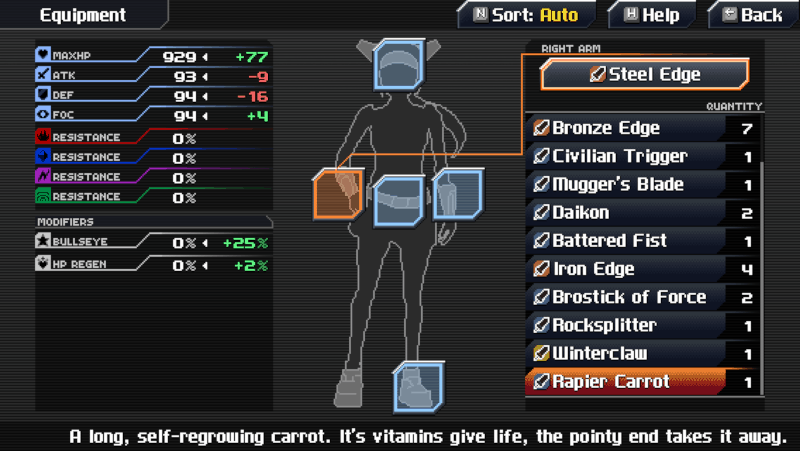
Gameplay
Yes, the story is great and all, but if there is one place that CrossCode truly shines, it has to be its gameplay. The game’s mechanics are fast-paced, challenging, intuitive, and downright fun!
You start off with a dodge, block, melee, and ranged attack, each slowly developing overtime as the character tree is unlocked. This all-too-familiar mix of combat elements balances skill and hack-n-slash mechanics in a way that doesn’t conflict with one another.
The game utilizes this mix of skills to create some amazing puzzle solving and combat that helps CrossCode’s gameplay truly stand out. Whether you are making your way through one of the four main dungeons, or you are taking a boss head on, you can’t help but periodically stop and think “wow, this game is great!”
Though this has to be the game’s strongest feature, it can also be the game’s biggest downfall. Part of the reason that the story and character progression is so satisfying is because the combat and puzzle mechanics can be incredibly challenging, and that’s putting it lightly.
There are times in which CrossCode’s gameplay feels downright impossible. Bosses take an expert amount of focus, and dungeons require all of the patience you can muster up just to simply finish them.
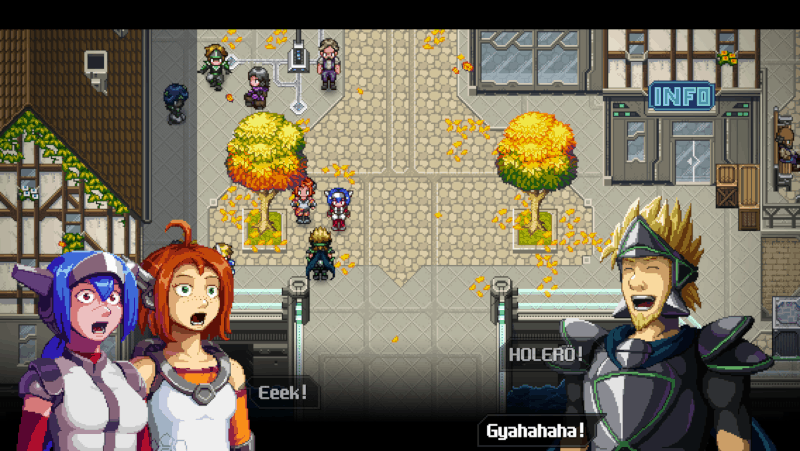
The game requires a type of dexterity I have not quite had to master yet. I mean, sure there are more challenging puzzle games out there, yes there are more difficult platformers, and of course there are more grueling RPGs, but adding all of these elements into one game while spurring the player along with an alluring story requires a level of mechanical balance that I haven’t found in many other games.
And though there were times I felt the gameplay was flat out punishing, I was constantly reminded that this is simply not the case. Death doesn’t cause serious character regression, you can take a break from dungeons when you feel overwhelmed, and there is a plethora of checkpoints throughout the game’s most difficult parts to help the player along.
Where other games fall short by giving the player nothing to lose, this reality redeems CrossCode amid its rigorous gameplay. CrossCode may be one of the only games I know that takes two common flaws in games and holds the tension between them so well that it becomes one of the game’s best strengths.
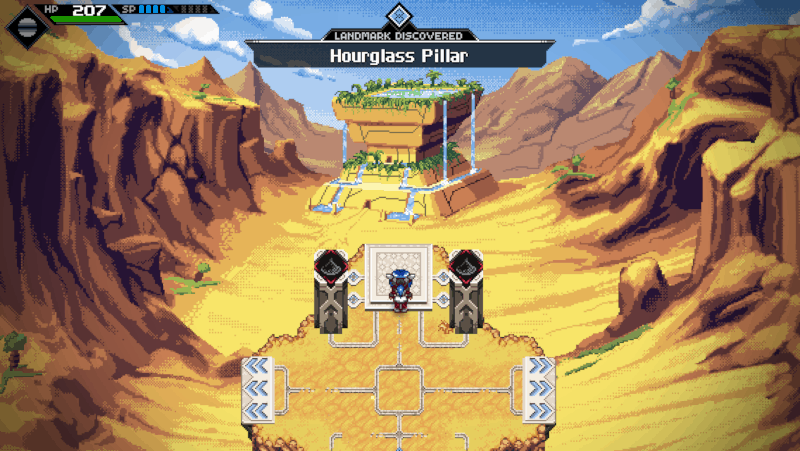
Design
One of the things that surprised me most about CrossCode was how well it’s world and sound design come together. Right off the bat, from the moment you boot the game up, it is clear the developers meant business when designing CrossCode.
Being in a fictional MMO world, the game’s character ensemble is vibrant and distinctive, each having its own tone and personality. The games sound and motion graphics are tactile and responsive, giving the player a healthy amount of feedback during gameplay. And the soundtrack behind the game is simply beautiful, ebbing and flowing between intense moments of combat to blissful moments of exploration.
If I had to fault CrossCode in this category it would have to be in the size of the map. Yes, the dungeons are long, and yes, the CrossWorlds map looks gigantic, but I still wanted more to explore outside crippling dungeons. The game is beautiful and fluid, but akin to RPG games of yore — aka. Zelda games pre-Breath of the Wild — I wish there was just a little more for me to freely explore.
It is obvious that the developers really cared about this aspect of the game, and you can tell they spent an incredible amount of time developing its design. CrossCode set itself up for success here in its plot and content, and the developers capitalize on the opportunity, knocking another category out of the park.
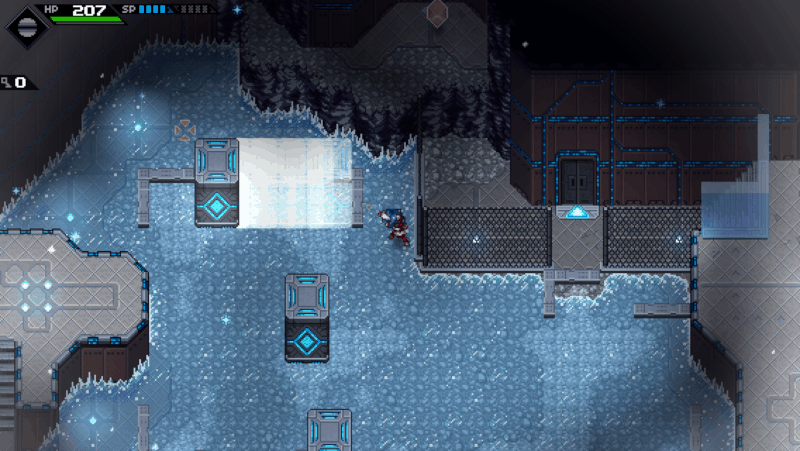
Conclusion
In the end, it is obvious how I feel about this game. And just in case you haven’t caught on yet…I love it. It holds a near perfect balance between being difficult and rewarding, simple and complex, linear and open, making CrossCode one of the best Linux games out there.
Developed by Radical Fish Games, CrossCode was officially released for Linux on September 21, 2018, seven years after development began. You can pick up the game over on Steam, GOG, or Humble Bundle.
If you play games regularly, you may want to subscribe to Humble Monthly (affiliate link). For $12 per month, you’ll get games worth over $100 (not all for Linux). Over 450,000 gamers worldwide use Humble Monthly.


